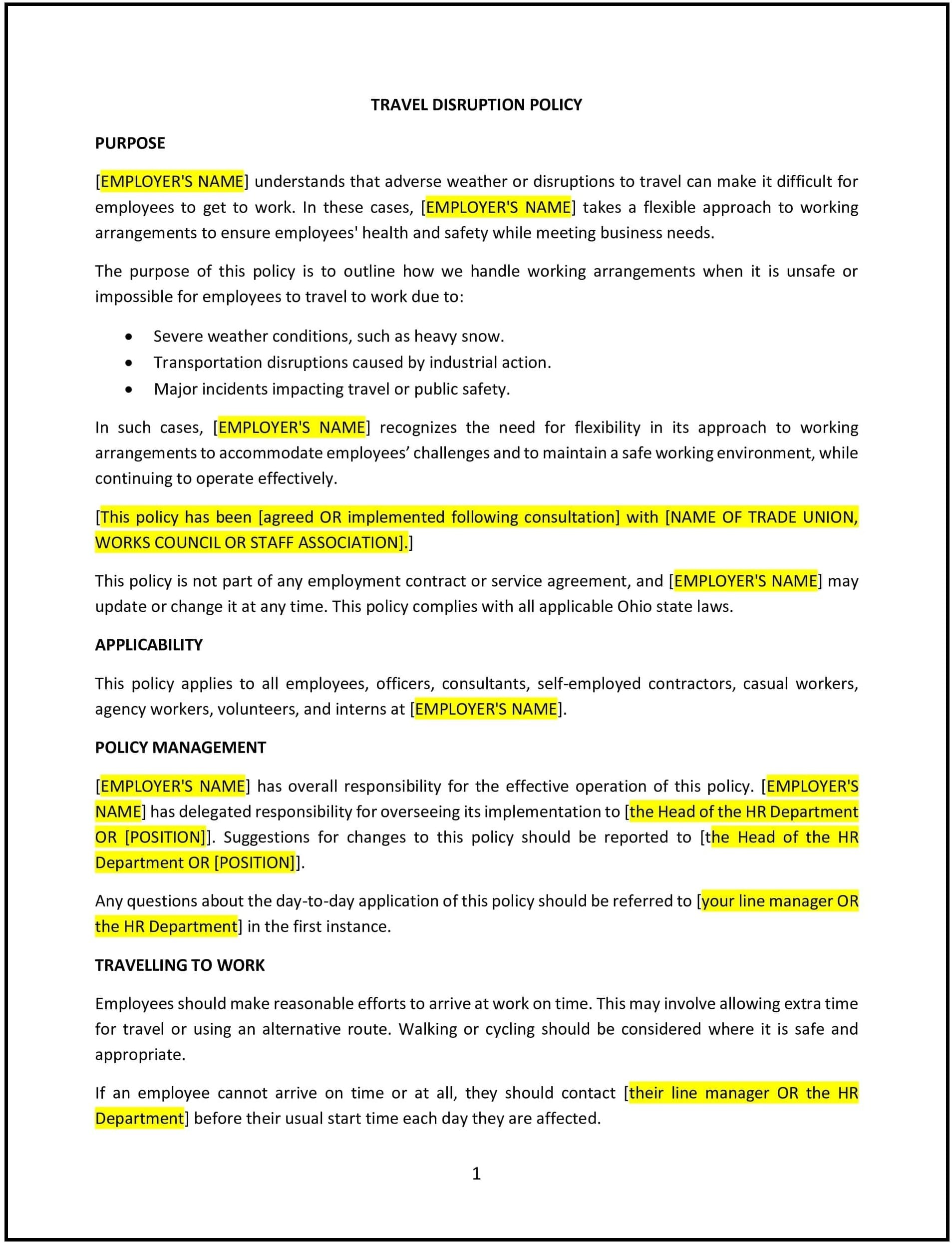Got contracts to review? While you're here for policies, let Cobrief make contract review effortless—start your free review now.

Customize this template for free
Travel disruption policy (Ohio)
A travel disruption policy outlines the procedures and guidelines for managing situations where an employee's work-related travel is disrupted due to unforeseen circumstances such as weather conditions, transportation strikes, flight cancellations, or other events that impact travel plans. This policy provides Ohio businesses with clear steps for managing disrupted travel, ensuring that employees are supported during these situations and that business operations continue smoothly.
By implementing this policy, Ohio businesses can effectively manage travel disruptions, minimize delays, and ensure that employees are not unduly impacted by travel-related issues.
How to use this travel disruption policy (Ohio)
- Define the types of disruptions: The policy should specify what constitutes a travel disruption, such as delayed or canceled flights, transportation strikes, weather-related issues, or natural disasters. It should also address other disruptions, like accommodation issues or lost luggage.
- Outline the process for reporting disruptions: The policy should specify how employees should report travel disruptions, including whom to contact within the organization, whether they should inform their manager, HR, or a designated travel coordinator.
- Provide guidelines for rescheduling or rebooking: The policy should explain the process for employees to follow if they need to reschedule or rebook their travel arrangements due to a disruption. It may include preferred travel providers or guidelines for booking alternative transportation or accommodations.
- Clarify business responsibilities: The policy should specify the business’s role in assisting employees with travel disruptions, including whether the business will cover any additional expenses incurred, such as hotel costs, meals, or transportation changes.
- Address employee responsibilities: The policy should outline the employee’s responsibilities in managing travel disruptions, such as keeping the business informed, adhering to the travel guidelines, and attempting to resolve the issue in a timely manner.
- Set expectations for delays or extended stays: The policy should outline how employees should handle extended delays or overnight stays, including any additional time off or compensation for extra travel-related expenses.
- Address safety and well-being: The policy should emphasize the importance of employee safety during travel disruptions, encouraging employees to take necessary precautions and contact the business if they encounter unsafe situations.
- Review and update regularly: The policy should be reviewed periodically to ensure it remains in line with Ohio state laws, federal regulations, and the evolving needs of the business.
Benefits of using this travel disruption policy (Ohio)
This policy provides several key benefits for Ohio businesses:
- Ensures employee support: By providing clear guidelines on how to handle travel disruptions, the policy ensures that employees are supported and know what steps to take in the event of an unexpected travel issue.
- Reduces stress for employees: The policy helps minimize the stress and confusion that often accompanies travel disruptions by providing employees with a clear process to follow.
- Maintains business continuity: A clear travel disruption policy helps minimize the impact of travel disruptions on business operations, ensuring that employees are able to resume work promptly after travel issues are resolved.
- Enhances employee safety: The policy emphasizes employee safety during travel disruptions, ensuring that employees take necessary precautions and have support if they encounter unsafe conditions.
- Protects the business from financial losses: By establishing guidelines for handling travel disruptions and covering necessary expenses, the policy helps protect the business from incurring unnecessary costs while supporting employees.
- Improves travel management: A well-structured travel disruption policy helps streamline the management of travel-related issues, improving the overall efficiency of business travel logistics.
- Increases employee satisfaction: A transparent and supportive policy can improve employee satisfaction by demonstrating the business’s commitment to addressing their needs during unexpected disruptions.
Tips for using this travel disruption policy (Ohio)
- Communicate the policy clearly: Ensure that all employees are aware of the travel disruption policy by including it in the employee handbook, reviewing it during onboarding, and offering reminders during travel preparation.
- Train employees on the policy: Ensure that employees understand the policy and their responsibilities in the event of a travel disruption, such as promptly reporting issues and adhering to the process for rebooking travel arrangements.
- Maintain clear communication: Encourage employees to stay in regular contact with their manager or designated contact person within the business if a disruption occurs, ensuring that all parties are informed of the situation and any necessary changes.
- Prepare for emergencies: Have contingency plans in place for major travel disruptions, such as natural disasters or transportation strikes, and ensure employees are aware of the emergency procedures to follow.
- Review the policy periodically: Regularly review the policy to ensure it remains relevant and effective in addressing travel disruptions. Adjust the policy as necessary to reflect any changes in travel practices, business operations, or Ohio state laws.